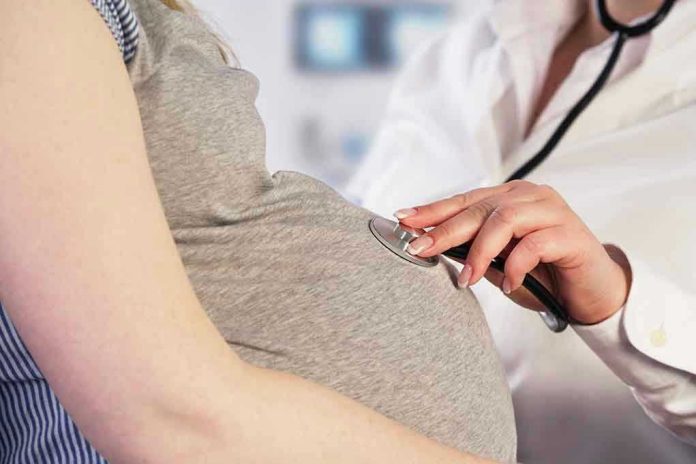
A woman’s miscarriage at home became grounds for felony charges that could have sent her to prison for a year, revealing how pregnancy loss has become criminalized in post-Roe America.
Story Overview
- Brittany Watts faced felony abuse of corpse charges after miscarrying at home in September 2023
- Hospital staff reported her miscarriage to police despite confirming the fetus was nonviable
- A grand jury declined to indict in January 2024, dropping all charges against her
- At least 412 women faced pregnancy-related criminal charges in the two years following the Dobbs decision
When Medical Tragedy Becomes Criminal Investigation
Brittany Watts, a 34-year-old mother of 14 from Warren, Ohio, experienced every pregnant woman’s nightmare in September 2023. After rushing to the hospital with severe bleeding, doctors confirmed her worst fears: her fetus was nonviable. What happened next transformed her personal tragedy into a legal battle that would capture national attention and expose a disturbing trend in American jurisprudence.
Watts miscarried at home shortly after her hospital visit, leaving the fetal remains at her residence. Hospital staff, operating under mandatory reporting requirements, contacted police about the incident. Law enforcement responded by launching a criminal investigation that culminated in felony charges against a grieving mother who had just lost her pregnancy.
The Criminalization Machine in Motion
The charge of abuse of a corpse carried a potential sentence of up to one year in prison. This legal classification treats fetal remains as human remains, a distinction that reflects the broader push for fetal personhood laws across conservative states. The Trumbull County Prosecuting Attorney’s Office filed the felony charge, though they later claimed they did not assess the evidence before advising on the charges.
She Was Ready to Have Her 15th Child. Then Came the Felony Charges. https://t.co/KuEPSVGYKY via @NYTimes
— S Sebag Montefiore (@simonmontefiore) November 3, 2025
This case represents more than an isolated incident of prosecutorial overreach. It exemplifies how laws originally designed for other purposes are being weaponized against women experiencing pregnancy loss. The abuse of corpse statute was never intended to criminalize miscarriage, yet here it was being applied to a woman who had suffered one of life’s most devastating experiences.
A Growing Pattern of Persecution
Watts’s ordeal is part of a disturbing escalation in pregnancy-related prosecutions. According to Pregnancy Justice, at least 412 women faced criminal charges related to their pregnancies in the first two years following the Supreme Court’s Dobbs decision. This represents a dramatic increase from previous decades, when such prosecutions were rare and typically involved drug use during pregnancy.
The legal landscape shifted dramatically after Dobbs v. Jackson Women’s Health Organization overturned Roe v. Wade in 2022. Without federal protections for reproductive rights, states have enacted increasingly restrictive laws that blur the lines between abortion and miscarriage. Medical providers now find themselves caught between patient care and legal reporting requirements, often erring on the side of involving law enforcement rather than risking legal liability themselves.
Justice Delayed but Not Denied
In January 2024, a grand jury reviewed Watts’s case and declined to indict, effectively ending the prosecution. The decision vindicated what many legal experts and advocates had argued from the beginning: that prosecuting a woman for miscarriage represents a fundamental miscarriage of justice. However, the damage had already been done through months of legal uncertainty and public scrutiny.
The case’s resolution highlights the arbitrary nature of these prosecutions. Grand jurors, representing the community’s conscience, saw through the prosecutorial overreach and refused to legitimize the criminalization of pregnancy loss. Their decision sends a clear message that common sense and compassion should prevail over ideological enforcement of questionable legal theories.
The Broader Implications for American Women
Dana Sussman from Pregnancy Justice captured the essence of this troubling trend: “Four hundred and twelve women were charged with crimes that would not have been crimes if they were not pregnant.” This statistic reveals how fetal personhood laws create a separate and unequal justice system for pregnant women, where normal activities and tragic circumstances can suddenly become criminal matters.
The implications extend far beyond individual cases. When women fear that seeking medical care for pregnancy complications might result in criminal charges, they may delay or avoid treatment altogether. This chilling effect on healthcare access poses real dangers to maternal health and safety, potentially turning treatable conditions into life-threatening emergencies.
Sources:
Mother Jones – When a Miscarriage Becomes a Crime
Pregnancy Justice – New Data on Pregnancy-Related Criminal Charges Since Dobbs
Texas Tribune – Texas Abortion Pill Capital Murder Charge Fetal Personhood













